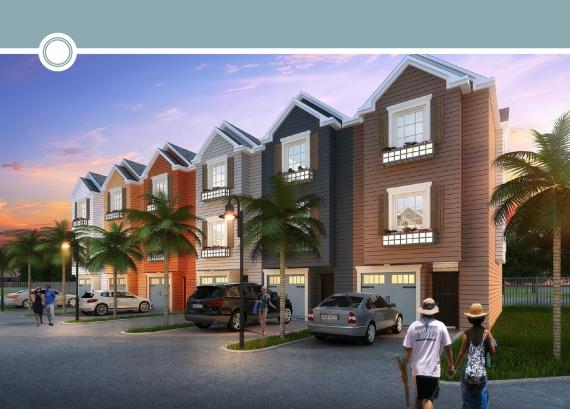Unrestricted Land - What Does It Really Mean?

Unrestricted land usually means that the land doesn't come with the same restrictions homeowner's associations impose, like home size, color or style. You may be able to place a mobile home or a tiny home on the property. There may not be any restrictions on animals either.
But there are other things that need to be considered before buying land labeled as "unrestricted."
What Does Unrestricted Land Mean, Really?
Most people assume that they can build whatever they want and do whatever they want when they have unrestricted land. That's not necessarily true.
There may be:
Deed Restrictions
Deed restrictions may limit the type of structures on the property. In communities, these restrictions may mean that homes have to have the same:
- Architectural aesthetics
- Roof colors
- Fences
- Mailbox styles
But even land outside of communities can have deed restrictions that regulate the amount of space between homes, how far back homes can be from the street and even how many cars are parked in the driveway.
Deed restrictions may also mean that the property can only be used for single-family homes. So, if you had plans to start a chicken farm, your dreams may come crashing down if there are deed restrictions.
Easement Restrictions
Easements are usually invisible, but most properties have them. They can include:
- Gas lines
- Building setback lines
- Ariel easements for power lines
- Sewer easements
- Street easements
- Traffic easements
- Utility easements
Easements can affect where you place your driveway – or if you can even have a driveway at all.
Zoning Restrictions
Zoning restrictions regulate how properties are used and developed. Most cities have multiple zoning restrictions and designated zone areas for industrial, commercial, multi-family and residential.
If land is advertised as unrestricted but is located in a residential zone, you probably won't be able to build a high-rise apartment building.
Unrestricted Land Definition – What it Really Means
If you come across a piece of property for sale that's labeled "unrestricted," it likely means that you can build any type or color home you want. You probably won't have to bother with architectural requirements or square footage minimums.
You may be able to place a mobile home or a tiny home on the property.
But you'll still need to obtain all of the proper permits and the structure must meet local building codes.
The Dark Side of Unrestricted Land
The idea of unrestricted land sounds great. You can build whatever type of house you want. But it's also important to remember that your neighbors probably have unrestricted land, too.
What if they don't give their home and property the same level of care you give yours?
We've all driven by properties that might as well be junk yards. Multiple cars are rusting away in the yard. There are piles of old tires and other debris everywhere. There may even be multiple RVs or trailers on the property.
Properties like this drive down the value of other properties in the area. And there's nothing the neighbors can do about it.
Inconsiderate neighbors can be a headache and property value drainer, but if you plan to buy several acres, this may not be an issue. If you buy enough land and in the right area, you may never see your neighbor.
Building on Unrestricted Land
Before you even think about building, it's important to make sure that the land is truly unrestricted – and that means checking for deed restrictions.
Even if there is no homeowner's association or community, there may still be deed restrictions. Two neighboring farms could have made a deal 100 years ago, and those restrictions may still be in place today.
Here are some deed restrictions that can ruin your day – and your plans for your dream home.
Bedroom Numbers
Some properties have restrictions that limit the number of bedrooms the home can have. Typically, these restrictions are in place because of the septic or sewer capacity is limited to a house of a certain size.
Pet Restrictions
Think you can have as many animals as you want on your property? Think again. Deed restrictions may limit the type and number of animals you can have on your land.
Some of the most common deed restrictions limit or prohibit livestock, like goats, chickens and pigs. And these restrictions are common outside of HOA-controlled neighborhoods.
Don't think because you buy property outside of a neighborhood that you can open a pig farm. There's a good chance that deed restrictions will prohibit livestock. Most of these restrictions date back hundreds of years, and they're designed to keep livestock out of residential neighborhoods.
Deed restrictions may also prohibit certain breeds of pets, prohibit residents from keeping pets outside and restrict the number of pets that can live on the property.
No Businesses
If you run a business from your home, you may need to find a new location for your operation. Deed restrictions may prevent you from conducting any business in your home.
These restrictions are usually put in place to limit the amount of traffic moving in and out of residential areas.
Adjacent Structures
Deed restrictions may limit external structures, like extra garages, sheds, detached workshops, pools and pool houses.
There may also be restrictions on what percentage of the property can be built.
Tree Removal
It's common for HOA-controlled neighborhoods to have restrictions on tree removals, but these restrictions may also be in place on rural land.
An agreement may have been made years ago between neighbors that limits or prohibits the number of or types of trees that can be removed from the property. That agreement may still be binding.
Vehicle Restrictions
Deed restrictions on motor homes, motorcycles and boats are some of the most common, and they can apply to properties outside of HOA-controlled neighborhoods.
In some cities, non-working cars are prohibited from being stored in front of the property.
Obstructing a Neighbor's View
If there's no neighbor in sight, this restriction may not be a problem. But if you plan to buy a lot in an area with neighboring houses, there may be a deed restriction in place that prohibits you from obstructing your neighbor's view.
While not as common, you'll often find this type of restriction in vacation areas. But even seemingly mundane things, like distant views of the mountains or a nearby lake, may be protected under this type of restriction.
These deed-restricted lots will affect the width and height of your home, which may prevent you from building the home of your dreams.
It's important to remember that not all "unrestricted land" will have deed restrictions. There are many properties that truly are unrestricted. This means that you can build any style home of any type as long as you have the permits and it meets local codes.
The Best Uses of Unrestricted Land
What's the best way to use unrestricted land? That depends on your goals.
Homesteading is a popular option for unrestricted land. When land truly has no restrictions, you can grow your own food, raise livestock and generally live off of the land. You may also live off-grid, using solar power as your main source of power.
You'll need to check the local laws to make sure that you can live off of your land this way.
If you're interested in building a tiny home, unrestricted land is probably your best bet unless you can buy a plot in a tiny home community.
If you're looking to live in a mobile home or RV, unrestricted land allows you to do this. You'll find that most other plots of land, especially in neighborhoods, do not allow you to have a mobile home on the property.
Other great uses for unrestricted land:
- Farming (for your family – there may be restrictions on commercial farming in the area).
- Timber sales
- Livestock raising
If you truly have no restrictions, you can do just about anything you want with your land.
Where and How to Find Unrestricted Land
Unrestricted land is often listed just like any other piece of land. Most agents advertise this feature because it attracts more buyers, so you're sure to see "unrestricted land" in the listing description. These lots tend to sell quickly.
If you have contacts in the industry, they may know of properties that will soon be listed. Some agents are in the business of seeking out potential sellers or have a pool of sellers that will only sell through their agency.
You also have the option of searching your local GIS to find properties in your area that are unrestricted.
It's important to do your due diligence when buying property that's advertised as "unrestricted." You may just find that the land does have restrictions in place – and those restrictions may have been in place for many decades.




